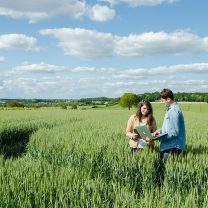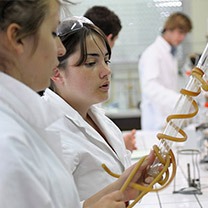
Overview
Farmers are experiencing profound changes in the context in which they practice their profession: changes in public policies, rising environmental, health and welfare standards, new technological developments, etc. This professional group is also undergoing major endogenous socio-economic changes with a significant renewal of its workforce, the emergence of new farmer profiles, collective forms of activity, and the transformation of structures. In this context, LARESS is questioning the evolution of the profession and competitiveness of agriculture, its social and territorial dynamics.
The agricultural profession is facing two major challenges: the renewal of the workforce, in a context where the average age of farm managers is high (51 years old), and the improvement of incomes when some farmers and farm employees have low or unstable incomes. In a context where the social group of farmers is struggling to reproduce itself, the increasing porosity of the profession – observed in particular in the trajectories and in the exercise of the profession – reinforces the questioning of the professional model, and contributes to its diversification.
LARESS describes and analyses ways of practicing the profession (in terms of equipment, economic models, and involvement in territories and networks).
What are the ‘professional models’ pursued by farmers and how are they reflected in business? In their performance, both economic and in terms of well-being ? How do they relate to the diversity of farmers’ professional trajectories?
The agro-ecological transition has become a major injunction from public authorities to farmers, and therefore a structuring reference framework for actors in the agricultural world to express and think about their modes of production and their evolution. At the same time, we are witnessing a decrease in public support for agriculture. Important challenges facing producers are changes in production practices and the (better) remuneration of their activity.
While the food sectors are seeking to qualify foods with respect to the greening of production methods, LARESS is analysing modes of valuation (evaluation / valorisation) of production practices. How and with whom is the value of agricultural production negotiated ? How can these characteristics be paid for?
The research team is composed of 5 sociologists and 3 economists.
The sociologists use complementary approaches (sociology of professions, sociology of work, economic sociology, socio-cognitive approachs to changes in practices). They use different methods: qualitative surveys, participant observation, monographs, network analyses, etc.
Our economists are mainly involved in agricultural economics, using different economic methods: modelling (mathematical and bioeconomic; Markov chain/entropy), efficiency analysis.
LARESS relies on a reinforced administrative and event communication team to develop partnership and transfer activities (#Esaconnect, agricultural change chair).
- Agricultural sociology
- Agricultural economics
- Territory
- Digital Evolution of agricultural professions and practices
- Ecologically intensive agriculture and agroecology
- Advisory activities for farmers
Our research projects
Consultancy Services
The members of the laboratory are frequently called upon by partner companies or institutions for consultancies (advice, conferences, training, etc.).
These interventions may concern:
- Research work, relating to our areas of expertise
- Conferences, in particular within the framework of general assemblies or work seminars of professional agricultural organisations.
- Conferences for the general public.
Recent interventions:
- ‘The evolution of farm structures in agriculture’ – séminaire Gaec et Sociétés – Webinar – dec. 2, 2021 – G. Anzalone.
- ‘Uses of digital social networks in agriculture’ –MSA d’Alsace – Webinar – oct. 22, 2021 – B. Thareau.
- ‘Understanding the sociology of farmers and their involvement in the profession’ – IFOCAP Paris, oct. 20, 2021 – B. Thareau.
- ‘Passing on our farms, passing on our know-how’, ARDEAR Pays de la Loire, June 24, 2021, A. Sigwalt.
- ‘The economic levers of food transition’, Webinar ‘Food transition and territorial projects’ SCET (Services Conseil Expertise et Territoires), April 1, 2021, K. Daniel.
- ‘End of family vocations and new business projects: how to pass on farms today.’- Evening agricultural debate – Community of the Pays de Craon – Dec. 19. 2019 – B. Thareau
- ‘Elements of analysis of the economic and social challenges of the development of digital / robotic tools in farms and agricultural sectors’ – 3RDF – Regional Chamber of Agriculture New Aquitaine – 5 Dec. 2019 – K.
- ‘The engagement of young people in professional collectives’ – Conference-Debate – Regional Federation of Western CUMAs – August 29, 19 – A. Sigwalt.
- ‘Organisation of work and provision of services’ – AG CUMA Pays de la Loire – St Clément de la Place (49) – Feb. 19 – G. Anzalone.
Study programmes
LARESS associate professors provide basic education for ESA students at Bachelor’s level in both economics (micro and macro economics) and sociology (introduction to sociology, agricultural profession and survey methods). At Master’s level, associate professors work on: animal production, plant production and agroecology, viticulture and oenology, environmental integration and sustainability and management. They are also involved in two international ESA Masters: Vintage (viticulture) and Food Identity (local products).
This involvement develops multidisciplinary social sciences – technical science approaches to issues in the agricultural sector, to involve students in LARESS research activities through group studies, internships and research projects.
The Unit can accommodate interns at the end of engineering studies or Master 1 and 2. Internships are part of ongoing research projects and are supervised by associate professors or professors from the team.
Through recent years, we’ve hosted M1 and M2 interns on the following topics:
- ‘Perpetuating farmer collectives to succeed in agro-ecological transition’ in the framework of the CASDAR COAGIL project
- ‘Understanding the effects of salary on the trajectories of agricultural installations’ in the framework of the Chair of Agricultural Mutations
- ‘Identification of organisations in the sector and characterisation of the diversity of farming systems involving the production of cider or cider apples’.
Partners
LARESS has developed on the basis of contributions to studies and finalised research projects intended to inform the more or less long-term decisions of private and public decision-makers and professional groups acting in the agricultural sphere.
The research projects developed are for the most part built in partnership. Beyond these projects, researchers contribute to these relationships through the publication of transfer documents, the facilitation of conferences and debates. In 2013, the implementation of the Agricultural Mutations Partnership Chair made it possible to consolidate relations with certain partners by working jointly to develop research around the evolution of agriculture.
The objective of the research unit is also to carry out work within the framework of French and international academic partnerships.
NATIONAL PARTNERSHIPS in in Economics and Social Sciences:
- INRAE (UMR Smart-LERECO ; AGIR ; CESAER ; LISIS ; SADAPT),
- GERDAL (Experimentation and Research Group; Development and Local Actions),
- Angers & Nantes Universities
- Institut Agro (Rennes-Angers–Montpellier).
- Companies in the agricultural sector: TERRENA, AGRIAL, EUREDEN, Crédit Agricole Anjou-Maine…
- Professional agricultural organizations: Chambers of Agriculture (in particular those of Pays de la Loire and Brittany), Association of Chambers of Agriculture of the Atlantic Arc (AC3A), TRAME, CIAP, FNCUMA, La Coopération Agricole, farmers Unions…
- Local authorities: Regional Council of Pays de la Loire, Intercommunities of Angers, Nantes, Le Mans and La Roche sur Yon …
- French public bodies: ADEME, Ministry of Agriculture, Ministry of the Environment …
- Associative partners: League for the Protection of Birds (LPO), fundations
- Partnerships with Institutes and technical centers: Institut de l’Elevage, IFIP, ITAVI …
- Mixed Technological Network ‘Labour in agriculture’
- Mixed Technological Network FILARMONI : ‘Economics of food chains’
- Mixed Technological Network NAEXUS : ‘Digital Agricultural Network for Education, eXperimentation and Uses of Digital Agriculture’
- Mixed Technological Network SPICEE : ‘Structuring and Producing Innovation in Crop and Livestock Systems Together ‘
- SORESE ‘Network of lecturer-researchers in agricultural sociology and agronomic schools’
The Agricultural Mutations chair aims to produce new knowledge and ideas and to stimulate debates on the future of agricultural and rural environments in the face of profound changes affecting the agricultural community.
Plus d’informations : www.chaire-mutations-agricoles.com


Do you have a question ?
Corporate Relations Service
Direction of Corporate, Alumni and Philantropic Relations
+33 2 41 39 64 67 dream@groupe-esa.com
